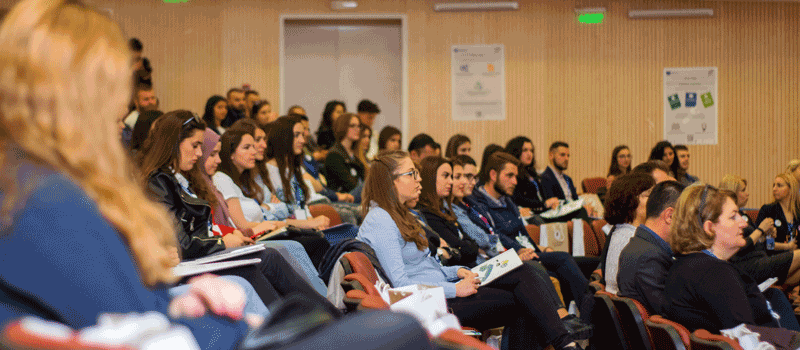IBC-M, together with University of Prishtina, organized the “Innovation Conference for Sustainable Future.” on the 10th of May, in the Central Bibliothek of the “University of Prishtina.”
There were many participants, from different places and universities present on that day.
The conference is a part of Ersamus+ Capacity Building Project titled “Creating Theory to Practice Centers for Innovation and Employment”, ran since 2018. The project is a consortium of 17 partners (IBC-M, Hochschule Geisenheim University, University of National and World Economy, University of Ljubljana, Salzburg Univesity of Applied Sciences, University of Prishtina, North West Regional College, University of Prizren Ukshin Hoti, The University of “Haxhi Zeka” in Peja, University of Applied Sciences in Ferizaj, Higher Economic Professional School from Pec Leposavic, and Kosovo Chamber of Commerce), which aims to improve the relevance of higher education for the labor market and the society in Kosovo through creating sustainable models of interaction between universities and enterprises. (Detailed information about the project can be found under the website: https://t2p-centers.com)
The aim of the Conference was to bring together key actors from the Higher Education sector to discuss the societal challenges in Kosovo and across Europe, changing the expanding mission of HEIs in exploring new approaches for getting closer to labor market needs and tackling existing quality and skills mismatches, as well as fostering international and national traineeship for student employability.
Prof. Dr. Marjan Dema, the rector of the “University of Prishtina,” opened the conference by quoting: “You can google knowledge in 2-3 minutes, but you can’t google skills.” He also spoke about the missing triangle approach between education, business, and public sector in Kosovo.
Prof. Dr. Mihone Kerolli-Mustafa, director of IBC-M, said that we invited students to understand how we can support them as they start their career.
The first session was led by Gentrit Berisha from UP, where it was discussed about the importance of innovation, barriers and how we are fostering innovation as a mindset. Moreover, the panelists emphasized new collaborations, critical thinking, proper education system, internships and the need to increase sponsored researches.
The panelists also gave examples and voiced their opinion on Kosovo’s innovation level.
Pia Stjervall quoted: “Innovation means change and that can be difficult for many. But we understand that we can’t continue as we are. Our population is changing in Finland. Visa liberalization will increase the innovation mindset. What is challenging in Kosovo is project implementation and getting people involved.”
Our honored professor Bujar Gallopeni led the second session. He highlighted how universities can contribute to prepare our students for the labor market. The topics which arose during this session were:
-Kosovo’s unique opportunities;
-Working with international partners will help us find models that build collaboration with the labor market;
-Development of soft skills and creativity skills;
-The importance of young leadership and teamwork
The panelists were asked how the political situation influences economic growth. If it is easier to develop your ideas abroad not in a developing country.
Mr. Fatmir Selimi said: ” Visa liberalization will not solve all our problems. You will be appreciated by your society here more than somewhere else.”
Mr. Fis Malesori claimed that the work he does here has a much bigger impact than any work he would do in the US, and the experience you get in the developing country gives you deferred experience in a developed country.
In the third part of the conference, the students together with the professors formed five groups and discussed the current and future problems they face. After talking for 45 minutes, each group’s representative mounted the podium and expressed their ideas.
One of our students, Kaltrina Hyseni, recommended: “Networking has always been important, and people have needed to network to survive. Everyone that I meet knows something that I don’t. Having more conferences for students to network is a recommendation.”
Another student, Aleksandra Lazarevic, pointed: “Usually high school graduates struggle to choose their career. In the end, we will choose something that we love. Do what you like, but know how to sell it in the market. We should train teachers to help students follow their dreams. Professors should motivate students to love their field.”
Bright students from other universities stressed how their institutions should change the teaching methodology and curriculum, hold more workshops, develop the students’ skills and study programme. They also brought to light the importance of volunteering.
In the end, Prof. Dr. Hysen Bytyqi said: “Our biggest challenge is how to interstate innovation throughout our HEIs. It’s expensive but worth it. Today, hearing from students has shifted my mindset.”
Prof. Dr. Mihone Kerolli-Mustafa wrapped up by thanking everyone who participated, encouraged the students to organize their conference and use the resources available to seek opportunities.
“The Innovation Conference for Sustainable Future” was a brilliant way for us to expand our knowledge, work and collaborate with other universities and its students, broaden our perspective and set new goals.

